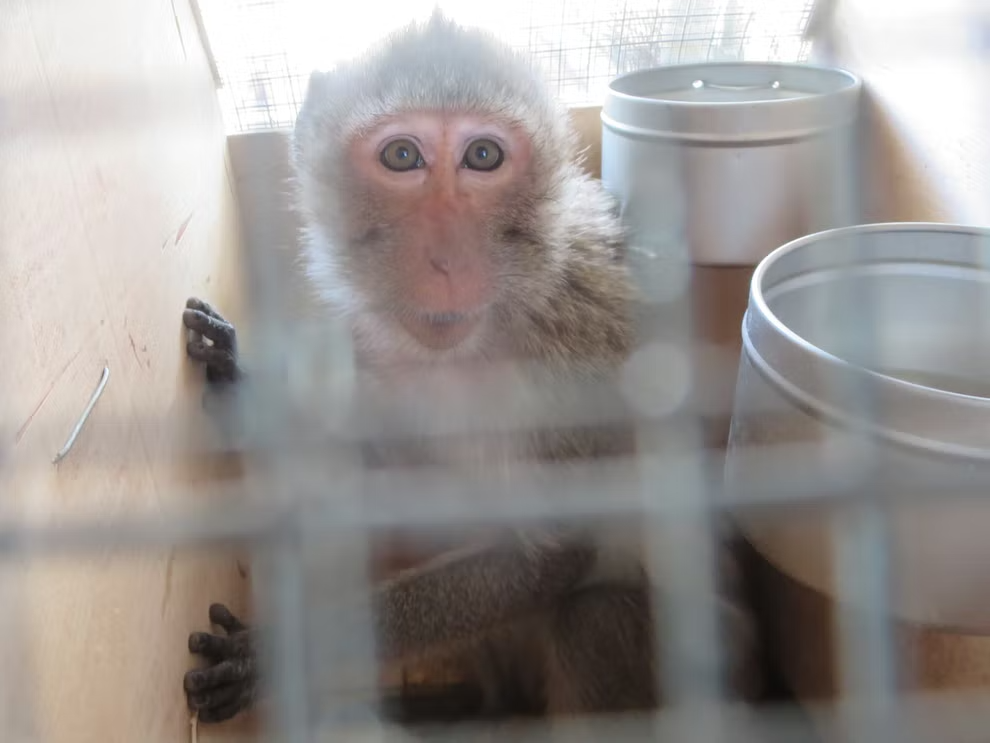US Shipment Of Illegally Imported Monkeys For Medical Research Leaves Over 1,000 Endangered Macaques At Risk Of Death Or Trafficking
Charles River Laboratories intends to send the juvenile macaques back to Cambodia, despite calls from PETA and Born Free USA to release the monkeys to a sanctuary.
This story is supported by
Photo: PETA
A recent shipment of monkeys illegally imported into the United States for medical research has left the fate of more than a thousand long-tailed macaques in limbo, with the animals at risk of being killed or returned to wildlife traffickers in Cambodia.
The endangered juvenile macaques were imported by Massachusetts-based research company Charles River Laboratories which buys, sells, and tests on animals. According to People for the Ethical Treatment of Animals (PETA), it is likely that the company has been prevented from experimenting on the macaques in US laboratories because they cannot prove the animals are captive-bred.
Last September, the U.S. Fish & Wildlife Service (FWS) asked Born Free USA and PETA for support in finding a sanctuary for the monkeys. After months of discussions and planning, Born Free USA agreed to accept the monkeys at its primate sanctuary in south Texas.
However, discussions stalled on March 13, when the FWS announced the macaques would instead be transported back to Cambodia where they were originally trafficked from.
“We have been in talks with Fish and Wildlife Services since September of last year and have repeatedly reiterated our desire and willingness to provide lifetime sanctuary for these young monkeys,” said Dr. Liz Tyson-Griffin, programs director and head of the sanctuary at Born Free USA. “These young monkeys will either be abandoned with no attempt at rehabilitation, or simply recycled back through the system and re-exported for exploitation in other labs. Either way, their future is bleak - this is a death sentence.”
To prevent this from going ahead, PETA stationed individuals outside the Charles River Laboratories’ Houston facility, while thousands of additional activists contacted the US Fish & Wildlife Service, urging the agency to release the animals to Born Free USA’s sanctuary. PETA also pledged $1 million to help fund the sanctuary placement.
“To learn that the government has decided to wash their hands of these innocent animals and ship them back to those who stole them from their wild homes is heartbreaking,” added Angela Grimes, CEO of Born Free USA. “They have been through enough. We stand ready to continue working with PETA and the government toward a humane solution.”
Credit: PETA
Wild long-tailed macaques are protected under the Convention on International Trade in Endangered Species of Wild Fauna and Flora (CITES). When the animals are imported into the US, special permits are required to ensure the trade is legal and does not endanger the survival of the species.
However, the demand for the species has only skyrocketed since the COVID-19 pandemic began, with the demand for primates in international laboratories fueling unprecedented levels of hunting and trapping and causing wild macaque populations to plummet drastically.
Just last summer, the conservation status of the species changed from vulnerable to “endangered” for the first time. Wild populations are predicted to drop by another 50 percent over the forty years if the current threats are not addressed.
Credit: PETA
Charles River Laboratories is currently facing ongoing civil and criminal investigations for its possible violations of monkey-importation laws, as well as Department of Justice (DoJ) indictments of Cambodian officials and nationals for allegedly selling wild-caught monkeys. At least 2,600 wild macaques are suspected of entering the US lab system on false permits since 2018, according to the indictment.
“Our efforts have kept these monkeys in the U.S., but their future is uncertain,” said PETA in a statement. “We have no assurance that this profit-driven company, now facing both civil and criminal investigations, won’t quietly load the frightened monkeys onto a flight to Cambodia so as to bleed every last dollar out of them.
“The U.S. government also bears responsibility, as it has contracted with Charles River for years, awarding the massive animal supplier more than $100 million to operate several of its animal laboratories, including the National Institutes of Health’s huge primate prison in Poolesville, Maryland.
“PETA and Born Free USA continue to work for the release of the monkeys, and we urge the government to take immediate action to demand their safe release to an accredited sanctuary.”
Take action. Please speak out and urge the U.S. Fish & Wildlife Service to rehome the macaques by sending them to Born Free USA’s Texas primate sanctuary by contacting them here.
We Have A Favor To Ask…
Species Unite amplifies well-researched solutions to some of the most abusive animal industries operating today.
At this crucial moment, with worldwide momentum for change building, it’s vital we share these animal-free solutions with the world - and we need your help.
We’re a nonprofit, and so to keep sharing these solutions, we’re relying on you - with your support, we can continue our essential work in growing a powerful community of animal advocates this year.
More stories:
Species Unite
A collection of stories of those who fight the good fight on behalf of animals.







Evaluating drugs with cutting-edge technology instead of animal testing will improve drug safety and cut development times, the agency said as it reveals a roadmap to increase non-animal research techniques.